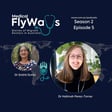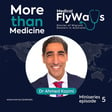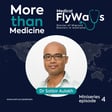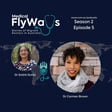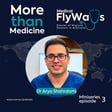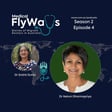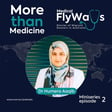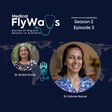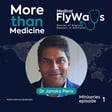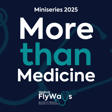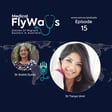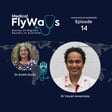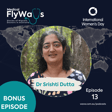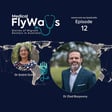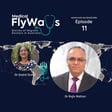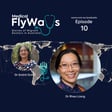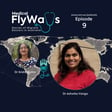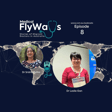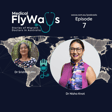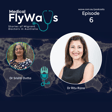Become a Creator today!Start creating today - Share your story with the world!
Start for free
00:00:00
00:00:01

Episode 3: Dr Lynda-Rose Chapeyama
Dr Srishti catches up with Dr Lynda-Rose Chapeyama, Zimbabwe-born GP psychotherapist, medical educator and sexual health advocate, who moved to Australia at 18 and completed a medical degree at the University of Newcastle. Now based in Naarm/Melbourne, Dr Lynda is passionate about medical education, and is an Associate Lecturer at the University of Melbourne.
Recommended
Transcript
00:00:01
Speaker
Medical
Introduction of Linda Rose
00:00:02
Speaker
Flyways, the untold journeys of migrant doctors in Australia. Welcome, Linda. Linda Rose, who is with us today, has been suggested or I was asked to invite you to the podcast by a previous guest. And so that's a first for this podcast. So I am glad you're here and happy to have this conversation with me. Well, thank you. Thank you for that warm welcome. Exciting to be here.
00:00:31
Speaker
So
Linda's Journey to Australia
00:00:31
Speaker
as I had said to you in our previous conversation, so what I know of your journey so far is that what brought you to Australia was studying medicine. And I'm hoping that you will be able to tell us a little bit more about that choice and the beginning of this journey.
00:00:48
Speaker
Of course. Okay. So, yes. Came here to study medicine. It's not that complicated a reason, to be honest. I'd never considered Australia to study growing up in Zimbabwe. The truth of the matter is that I was in the UK doing my A-levels.
00:01:08
Speaker
got to the pointy end and needing to find somewhere to do further study. And the reality is that Australia was a lot cheaper than either the UK or the United States where I would have had to go and do an initial degree and then do postgraduate medicine at the time. I was able to come to Australia and apply and get into an undergraduate medicine degree. And yeah, that's where it started.
00:01:32
Speaker
And Australia is lucky to have you here is how I would put it. So I think it's sometimes interesting because when we talk about workforce and even general practice or medical workforce, what you've highlighted is there is actually a choice. And someone that's choosing Australia actually has considered, at least in my mind, as you said, the UK, the US, Canada, at least those options. Now, what do you think, having chosen it based on
00:02:02
Speaker
As you described there was the price point which you had to consider whether any other factors that you took into account or any other non quantitative factors about which you had information that you considered. They may not have been major factors.
00:02:17
Speaker
I think for that it probably came down then when choosing where in Australia to go. So I ended up in Newcastle, New South Wales. The weather looked really good. The beach sort of aspect in that city were also very attractive. Look, I'm happy to be very, very honest because my father was paying for medical school for me. And I think at the time the Australian dollar was less than half the value of the pound or something.
00:02:44
Speaker
And so you're looking at being able to pay for two and a half years of medical school, what you would have paid for what in the UK. And then similar, you know, sort of changes when it came to the US dollar or the Canadian dollar as well. So I think my choices started when you go to a uni fair. At the time I actually went to one in Botswana because that's where my father was living and working and walking around and talking to the representatives from different Australian universities.
00:03:12
Speaker
East Coast, more attractive because they look like more fun places to go. And then Newcastle, as I said, the lifestyle, it wasn't too intimidating, I think, as well. It was in this massively big city. And then, yes, I applied. I applied. I ended up getting into Melbourne Medical School and Newcastle Medical School after a year of sort of basic sciences and stayed in Newcastle because it was comfortable and it started to feel like home.
00:03:36
Speaker
And so that's where I stayed for a great number of years. Fantastic. I
Building a Community in Australia
00:03:40
Speaker
know that you have only moved Melbourne fairly recently and that Newcastle was home for a very long time. Were there any others that were there studying with you in the UK or any other previous medical students that you had contact with or any other social groups or connections that you had prior to getting to Australia? There was no one else that I knew personally. A lot of the people I knew had actually stayed in the UK.
00:04:05
Speaker
So coming from Zimbabwe, a British colony, I have a lot of colleagues who ended up at the University of Birmingham, for example. The University of Zimbabwe Medical School and Birmingham University were sister schools, sister medical schools, with a lot of UK exchange students doing placements in Harare and the city I lived in and vice versa. And I think at one point you could leave the University of Zimbabwe Medical School and your degree just be automatically
00:04:31
Speaker
acknowledge by the University of Birmingham, for example, almost an equivalency. So a lot of the people I actually know had stayed and gone to Nottingham University, Birmingham University, I have really good friends. I grew up with in Zimbabwe, who went to the University of Dublin, for example, and studied medicine. So coming to Australia for me was a big unknown, a bit of an adventure.
00:04:53
Speaker
Seems really exciting though, you know, growing up having watched where there was some Australian rules on late night TV and, you know, Neighbours, Skippy, Bush, Gangaroo, that's probably all I really knew about Australia. I don't think you'll be the only person that remembers Neighbours from when you, I distinctly remember it being my escape in high school, certainly. Now, choosing that, it sounds almost like a very brave decision to make, not knowing what to expect. How do you think that decision has served you?
00:05:22
Speaker
Since then? Yes, Australia is home for me now. It's home. My family is here, my husband, my children. My mother's a registered nurse and midwife. She eventually immigrated here as well. My brother ended up studying accounting here in Australia, so it is. It's my home. I have good friends, friends I grew up with in Zimbabwe who live here now as well, friends I met at university who are still wonderful friends. It's interesting you call it brave because I know
00:05:51
Speaker
As an 18-year-old, that concept didn't occur to me. It was just actually a bit of an adventure, a bit of fun. In some ways, I think I thought I'd come here and study and probably leave. I'd probably go back to the UK or maybe the US. Growing up, those places had seemed much more familiar. In some ways, I think I thought maybe six years in Australia, get the piece of paper I want so I can do the work I want.
00:06:16
Speaker
and then go back to what I know. So, a surprise more than anything, I guess, that, you know, 20 odd years later. A pleasant surprise? Yes, yes. A very happy surprise when I think back. But it certainly is home. Now, you've so far given us a very positive picture of things. I'm
Challenges of Racial Isolation
00:06:35
Speaker
sure, knowing what I know of you, there would have been challenges along the way. Can you think of anything that made you question or doubt your decision?
00:06:43
Speaker
I think that particularly moving to Newcastle, so we're talking 2001 at that time when I first moved, there was a very profound sense of being the other. There weren't very many people who looked like me. There weren't that many black people around in the town, as it were. There was another black woman from Kenya, I think, who was in my course and then a couple of others as well. But you could have counted the people who looked like me on one hand in some ways.
00:07:13
Speaker
who were doing medicine. There were a few others involved when doing other courses, but again, very clear that you were different. I remember distinctly being at a shopping center at a summer family. Funnily enough, my husband and I ended up buying a home in years later. But as a newly arrived student and I was standing there, I think looking at something on a shelf and a person walked by and intentionally walked up to me and said, your friend is over there. And I had arrived by myself and gone to the shopping center.
00:07:42
Speaker
I remember turning around and she was pointing to the only other black person that was inside. And I just looked at her, I half smiled and I continued as I was. But there were many moments like that where it was just like, the concept was just very, not confusing, but different. Unfamiliar. Yeah, unfamiliar. So living in the UK before I moved here, your experiences were a race.
00:08:08
Speaker
different and there can be points where it's uncomfortable. I do, I remember that moment, I really do. It said a lot I think about where I was and there were moments where I wondered why I was here and maybe I should go study something else, anything else, somewhere else.
00:08:23
Speaker
And compare that to when you've been in Melbourne, do you think there's a different experience to be had in a bigger city with a bit more of a multicultural? I think that is hard to say because I guess now I am so much older, so much more comfortable in my skin compared to 18, 19 year old me. Again, with the some of the privileges I have where I live, there are not that many other people who look like me. But it's not something that I'm
00:08:49
Speaker
aware of to a great degree. There is a lot of diversity in Melbourne that all surrounds, but it's not uncommon that I'll end up somewhere and still be the only black woman who walks into the room, right? Particularly in medicine circles. So that in itself hasn't changed that much in terms of trying to think if there's another young woman of colour, or I should say black woman rather, at the University of Melbourne where I do some tutoring and I don't think there is. I think I've seen some black men
00:09:19
Speaker
but not black women or black young women who are students. So yeah, it's an interesting space.
00:09:27
Speaker
is aware of it. I'm not paying attention to it. But I wonder if 18-year-old me turned up today in Melbourne. What would it be like? Yeah, what she would think. Fascinating. I'm going to ask you another question following on with that. So the experience of that in a social construct or in a community construct, I can certainly relate to it in some ways in regards to medicine or the profession we're in. Has that proved to be a barrier or a challenge in any way?
00:09:55
Speaker
Again, that's difficult to think through. I can only assume it must have been. Because I know how it is a barrier in many other aspects of my life. So in a lot of other situations, it's just more overt. When people, if I walk into a space and people don't know who I am, or I don't know, David Jones and I'm the one being followed, for example, to make sure I'm not stealing.
00:10:20
Speaker
quite obvious that that's happening. So in a lot of other situations, it's avert. It's in your face. You know what it is. You know you're being othered. You know, it's very obvious. In medical circles, I think there would have been a lot of people who perhaps don't know what to make of you, in some ways maybe ignore you.
00:10:41
Speaker
And other situations probably underestimate you until they actually meet you. There's an interesting term, and I'll throw that in here. It's called micro-exclusion.
00:10:53
Speaker
I've only become familiar with it recently in my work around the podcast, but when you say ignore you, I suspect if you're in a room full of people, and I certainly can speak to that of being in a medical group where everyone else went to uni together, for example, and there's this hubbub of conversation around things. For a good period of the time you're there, that's all that everyone talks about. You're the only person that didn't go to that medical school.
00:11:20
Speaker
or you might be the only person that didn't go to that high school from where other medical students came. I think what you're saying is measuring it objectively is hard because your experience is yours and we're not measuring it against anything else. That's right. What about patients? Have you experienced any comments, any suggestions of your abilities being a person of color and being a doctor? How much time do we have? How much time do we have?
00:11:49
Speaker
So look, it's again, multi-layered. It's from the being the, I would have been a resident, I guess at the time, asked to review someone's chest pain on the ward and you walk into the room and daylight hours, they look up and tell you they don't want any afternoon tea. Thank you very much. At other times of the day, walking in, I think I would have been a night shift and then walking in and they point to their, either their commode or their urinal and ask me to empty it.
00:12:18
Speaker
or empty the bins. And then when I, you know, I'm wearing scrubs, they've got a doctor on them, I've got a stethoscope around my neck, but I'm still being asked to empty the trash because all they, when they look, when the patient looks up, that's who they see. And then, you know, say, I am Dr. Linda Chapia, I'm here to review for chest pain and have to repeat that. Because again, all they're seeing is the person who's walked in and their color and the assumption of what my role is. Even at the moment,
00:12:48
Speaker
In general practice, patients who are new, I'm aware of, I think a lot of receptionists will often, if someone needs an urgent appointment, they might book it with Dr. Linda Rose. So a lot of patients assume Rose is my last name. And when I walk into the waiting room and say someone's name, there are very obvious looks of confusion, even behind masks, right? And they do, they look up, they don't see a doctor, so they look back down and it's, you know,
00:13:14
Speaker
it clearly makes more sense that they've imagined hearing their name than the person in the waiting room have said their name. So yeah, it's always interesting. Again, I say that almost quite removed from those experiences now. I accept them for the reality of what they are, but I'm not, they're not something I dwell on and they're not something that I know affects how I then do my job. But I know that there would be a lot of people for whom they'd be quite difficult.
00:13:42
Speaker
in a lot of ways. And I have a lot of privilege. I sound like I do. I sound like an Australian. I know I do. I studied in Australia. I have a lot of references, whether it's colloquial slang, that I can understand with patients. And so there are a lot of layers. The AFL or anything else that you can relate to? Yeah, exactly. I can talk about who I barret for. I go to the MCG. Lots of things like that. I have children. I have birth here. I'm starting to understand the school system here.
00:14:10
Speaker
So there are many things that I can use to mitigate that, and I find very quickly patients will then get comfortable because they see the common ground. So I am quite mindful that without a lot of that, a lot of those privileges and intersections, it'd be a very different interaction. You would be othered from start to finish, and I can't even imagine how you'd then build rapport. So for me, there are things I still notice, but I'm also aware that they don't impact me as intensely as they could.
00:14:38
Speaker
And
Navigating Australia's Medical Regulations
00:14:38
Speaker
I should add that when we started off with this series, we were talking about, you know, introduced the series as one with international medical graduates. And we have said multiple times here that you studied at Newcastle. Just there is a small group of people, I should say, that study in Australian medical schools who have also got to deal with certain structural rules and regulations that apply to all international migrant doctors, as I put it.
00:15:07
Speaker
So would you have had to have to deal with the moratorium or part of the moratorium and what was your experience or what did you see as its effect on how you navigated your post fellowship or fellowship career? So the moratorium in and of itself was a bit of a surprise to me because I came to study, had not looked at that detail as a 17, 18 year old looking to get into medicine about what, you know, what does that look like 10, 20 years later?
00:15:36
Speaker
And so because I was an international student when I started my medical degree and not a permanent resident or citizen, the moratorium absolutely applied to me. This of course was news to me when I was looking at applying for general practice training. I had done medical school, graduated, done my resident years in the Hunter New England area. And not until I was looking at the detail of applying for the Australian general practice training program.
00:16:04
Speaker
Did that all then come back when you're looking at your eligibility? Oh, I'm an international medical graduate. What does that mean? And then it all unravels. And so yes, it absolutely did. So living and training in Newcastle, I think at the time I applied for general practice training, Newcastle and Surrounds did not qualify as
00:16:27
Speaker
what do they call it? Areas of workforce shortage back then or something, I think. Yep, that's right. Yes, DPA now is what they're called. Yeah, DPA is what it is now. But I think if I drove to Maitland or a bit further, it would count initially. And then what then happened as well. So at the time, I then spent a lot of time reading up on the website, reasons you could get exemptions, what you could do, what you couldn't do.
00:16:52
Speaker
So I ended up doing another term that was essentially hospital based, but it was alcohol and drug medicine. But that was extended skills, part of my general practice training, while trying to figure out a way to find an exemption. In the end, because my
00:17:10
Speaker
Husband is an engineer. He's an Australian though. So I was able to be honest, I look back now and I think the rules are supposed to be, if you are immigrating here with a partner or spouse who cannot easily find work elsewhere and they are in a necessary skill or something like that. But I didn't actually qualify for that category. My husband is an Australian, born here, trained here, was just working his engineer job here.
00:17:40
Speaker
I actually think, and I know a few people with other immigration stories, I think the person deciding my case, and I shouldn't be saying this on the podcast. I think they felt sorry for me. I honestly think, because I remember getting an email that asked me to change some part of my wording in my statement, and I think they went, okay, you're exempted while training.
00:18:01
Speaker
And so the idea was I would be exempted while training if I understood it correctly. But once I got FRA CGP, I would need to go. You still would be bound by the duration. Yeah. Yes. But my duration still started from when I graduated medicine. So it wasn't from fellowship. But by the time I'd finished and got my FRA CGP, enough areas close enough to Newcastle were now areas of need. And so then it didn't mean I was driving three hours or something to a job.
00:18:31
Speaker
So it all fell into place somehow, but quite a shock when I first realised there was this moratorium I knew nothing about. And you asked me for advice and I thought, well, you should have known about that. And I'm going, how? It's interesting, isn't it, that if you're actually applying to universities, clearly the university didn't feel obliged to inform you about any of these implications, number one. And I think it's worth highlighting for anyone that's
00:18:55
Speaker
For example, with regards to the exemption, it's an individual assessment. Each application is assessed individually for its merit. So you could say your story worked out fine. And as you said, there's several others where someone might say that it didn't in their favor. It does boil down to that individual application. So you can't really bank on that either. Like I said, I cannot tell you what part of it eventually got me over the line because when I look at the letters of it, I didn't really qualify.
00:19:24
Speaker
I don't think we need to worry. I think whatever it was, the stars were aligned is how I would think of it. That's right. Stop talking about it. Stop talking about it. It's fine. Yeah, that's all good. And I think that Newcastle, that would have been an ideal place for you to continue with your training, having formed the connections you would have to the place.
00:19:45
Speaker
This one is specifically having talked about the decorative let's not call them hurdles maybe just little road bumps then that's what you characterize them for us as having talked to them was there if there's anyone considering coming over to work in or study in australia right now what would your advice to them be.
00:20:04
Speaker
What
Advice for Migrant Doctors
00:20:04
Speaker
do you think they need to, we're in a world where a lot of information is accessible, how do they make themselves aware of some of these things, rules, regulations? What helped you or what do you think would be helpful to them now? So I think that, particularly for talking about doctors coming over with a lot of us and our personalities, I think the idea is that everyone thinks if they do their homework, get all the forms, tick all the boxes, everything will just work.
00:20:32
Speaker
I think that if they've decided to come to Australia, there's got to be an acceptance of the level of uncertainty there would be. I think that if you decide to come, you obviously need to do the right visas, the AMC and all those steps that a lot of people do coming from overseas, but also have an openness and a willingness to link in with people once you're here. I think the reality is that it's just unpredictable. And even in the times that we are now, you know, with changes to Medicare and the MBS and
00:21:02
Speaker
I don't know. Do we call it post COVID? I feel I struggle with that because COVID is still very much real. But anyway, in these times it is I don't you almost need to let go of that need for everything to be sorted.
00:21:13
Speaker
And I guess flexibility in that sometimes the actual dream you have of being in whatever suburb may look slightly different once you get here. But I think there is a lot to explore in terms of career, opportunities, the lifestyle, the life you can build. It's not going to be easy, but yeah, I struggled to sort of give a list of what to do.
00:21:33
Speaker
There's a couple of very specific things you've said. I think I'll reframe it as be willing to lean into the uncertainty. Look for support structures or support networks or peer groups is what you're describing them as almost. Be prepared to think of your values and not the objective markers of success that everyone else might be seeking you to share with them.
00:21:54
Speaker
And you know adjust to what opportunities come your way is what you're saying is it's not necessarily what you thought it would be but there's still a lot more here to make a successful what you thought your life would be like. What will your support networks then. What will your peer group support networks and you know what do you think was contributed to where you are now in that sense.
00:22:17
Speaker
I feel I managed to make some really good friends through medical school. People I could trust, I still trust today. I've maintained really good connections as well with other women of colour regardless of what they do for work, so not necessarily medical. So for me it's been about being able to maintain my sense of self and sustain that in a way because there are attacks on it.
00:22:40
Speaker
There is the othering, there is the dismissal of who you are in a lot of ways. So maintaining your core sense of self and who you are is really important. You've got to lean into who you are to be able to survive everything that comes your way, I think. Regardless of what area of medicine you're going to be doing, let alone the very difficult area of general practice we now have in Australia. And then still try to have some fun. Go out and have some fun.
00:23:08
Speaker
Take the kids out, do things, plan your holidays to be able to fill up your cup.
00:23:13
Speaker
Plenty of fun to be had in Australia, for sure. Absolutely. Now, at the end of the podcast, we normally do a rapid fire. And
Rapid-Fire Questions with Linda
00:23:21
Speaker
this is three words that I will throw your way. And you're allowed to say whatever you want. You want to say something. You want to phrase a word, an emotion, a thought, whatever it is. So the first one, and I will use it for you as well, because it certainly does apply, as you've discovered. First one is IMG. Unique.
00:23:43
Speaker
Okay. Second one is race. Complicated and ever-present, but also so very beautiful if you lean into it. And something that's not scary. I find a lot of people are afraid of race. It's not scary. And the last one is equity. Ah, the pot of gold at the end of the rainbow, eh?
00:24:07
Speaker
Still not achievable then? Not quite yet. Not quite yet. Okay. Thank you so much.
Conclusion and Future Guest Recommendations
00:24:12
Speaker
That was amazing. I am absolutely in awe of you. And I hope the person that asked to hear more of your story has got what they wanted. And if not, they can contact you directly too. So thank you so much, Linda. And I will not put you in the spot, but you are more than welcome to send me a recommendation. If there's anyone you can think of that you'd want to be a guest on this one.
00:24:33
Speaker
Oh, excellent. I'll have to have a think. Thank you so much for having me. It's been a lot of fun.
